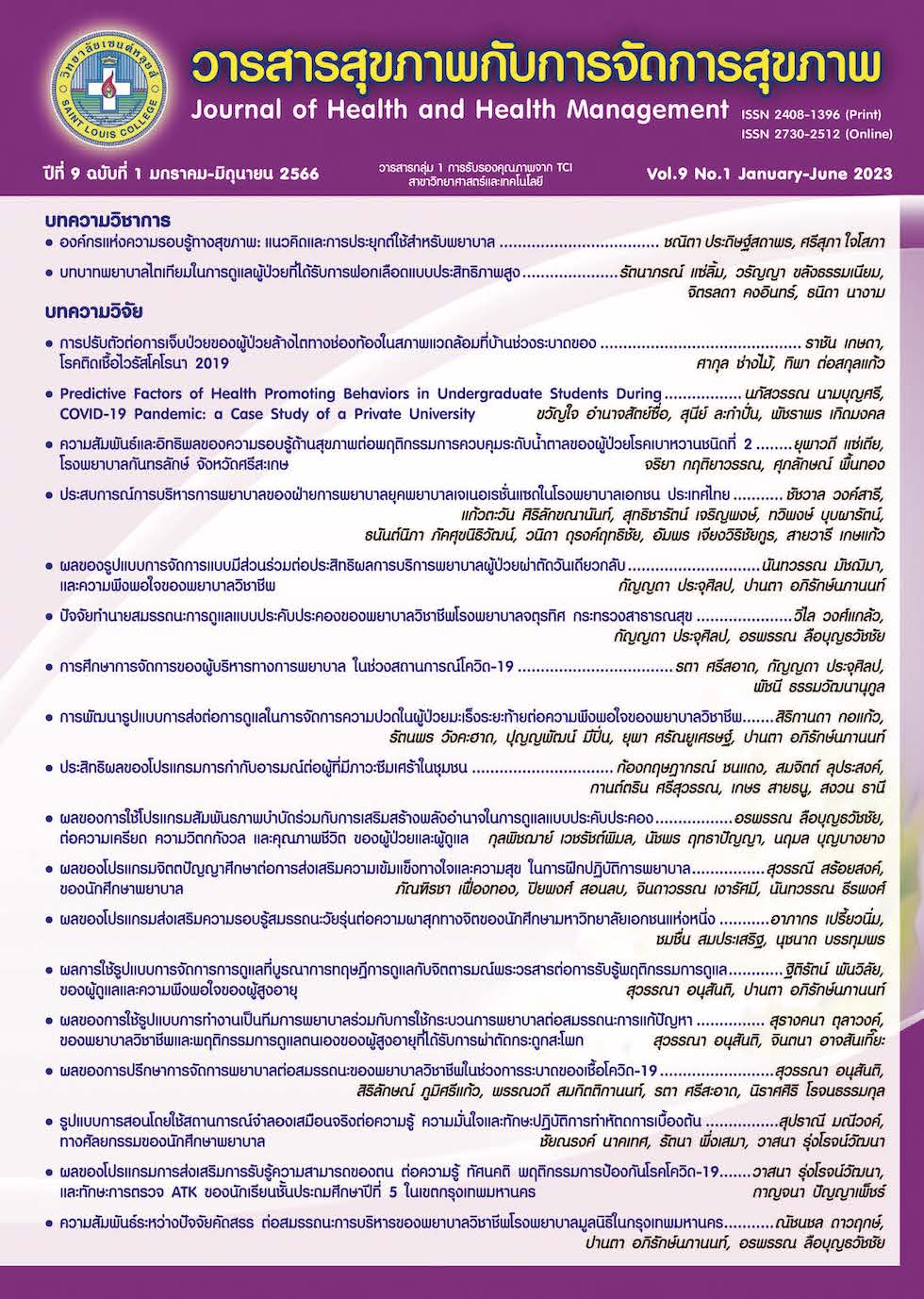The Effect of Self-efficacy Promotion Program on Knowledge, Attitude, COVID-19 Prevention Behaviors and ATK Practical Skills Among Fifth-Grade Elementary School Students in Bangkok Metropolitan Area
Keywords:
self-efficacy promotion program, knowledge, attitudes, behaviors, ATK practical skillsAbstract
The study aimed to investigate the effect of self-efficacy promotion program on knowledge, attitude, COVID-19 prevention behaviors and ATK practical skills among fifth-grade elementary school students in Bangkok Metropolitan area by using Quasi-experimental research designs, two group pretest-posttest and follow-up to examine. A cluster-random sample of 62 students was divided into an experimental group 31 students and a control group 31 students. The instruments were a knowledge questionnaire, attitude questionnaire, COVID-19 Prevention Behaviors questionnaire, and ATK practical skills questionnaire. The content validity index (CVI) of the entire questionnaire was .97, with reliability of .88, .71, .84, and .86, respectively. Data were analyzed using a repeated two-way ANOVA and an independent t-test.The results showed that after the intervention and evaluation phases were completed, the experimental group achieved a higher average score of knowledge, attitude, COVID-19 prevention behaviors and ATK practical skills than the control group, with statistical significance (p< .01). Within the experimental group for each period, there was a statistical difference in knowledge score (F = 27.873, p < .001), attitude (F = 13.302, p < .001), COVID-19 prevention behaviors (F = 13.439, p < .001), and ATK practical skills (F = 20.916, p < .001). This program provides students with the knowledge, attitudes, COVID-19 prevention behaviors and ATK practical skills. Community health nurse could apply this program by working cooperatively with the teacher in order to apply this program in classroom teaching and be available to other student groups to disseminate knowledge and skills to advance policy change and establish curriculum teaching in elementary schools throughout the country.
References
กชกร ธรรมนำศีล, กาญจนา ปัญญาเพ็ชร์, สุปราณี น้อยตั้ง, และชัยณรงค์ นาคเทศ. (2565). ผลของโปรแกรมการรับรู้ความสามารถของตนต่อทักษะการปฏิบัติช่วยฟื้นคืนชีพขั้นพื้นฐานของนักเรียนชั้นประถมศึกษาปีที่ 4 ในเขตกรุงเทพมหานคร. วารสารแพทย์นาวี, 49(2), 334-349.
กรมควบคุมโรค กระทรวงสาธารณสุข. (2563). ข้อมูลสำหรับการป้องกันตนเองจากไวรัสโคโรนาสายพันธุ์ใหม่ 2019. สืบค้นจาก https://ddc.moph.go.th/viralpneumonia/file/introduction/ introduction01.pdf
กรมควบคุมโรค กระทรวงสาธารณสุข. (2564). รายงานสถานการณ์โรคติดเชื้อไวรัสโคโรนา 2019 ฉบับที่ 572. สืบค้นจาก https://ddc.moph.go.th/viralpneumonia/filesituation/situation-no572-280764.pdf
กระทรวงศึกษาธิการ. (2563). แนวทางปฏิบัติสำหรับสถานศึกษาเพื่อป้องกันและควบคุมการแพร่ระบาดของโรคโควิด-19 (COVID-19). กรุงเทพมหานคร: สำนักงานกองทุนสนับสนุนการสร้างเสริมสุขภาพ.
กัลยา วานิชย์บัญชา, และฐิติ วานิชย์บัญชา. (2558). การใช้ SPSS for Windows ในการวิเคราะห์ข้อมูล (พิมพ์ครั้งที่ 27). กรุงเทพฯ: โรงพิมพ์สามลดา.
กิจติยา รัตนมณี, พิพัฒน์ นุ่นด้วง, สุวนันท์ ทิศลูน, ไพลิน สัญญากิจ, ปัณฐิตา พรมเสนะ, และพัทธนันท์ สอนสวัสดิ์. (2565). ผลของปรแกรมการรับรู้ความสามารถของตนเองและการใช้หลักการ 2 ม 2 ว ต่อความรู้และการรับรู้ความสามารถของตนเองในการดูแลและป้องกันการเกิดโควิด-19 ในเด็กวัยเรียนประถมศึกษาตอนปลาย. วารสารวิจัยและนวัตกรรมทางสุขภาพ, 5(2), 189-201.
เกษราภรณ์ อ่อนทอง, นฤมล ธีระรังสิกุล, และศิริยุพา สนั่นเรืองศักดิ์. (2564). ผลของโปรแกรมส่งเสริมสมรรถนะแห่งตนในการดูแลตนเองต่อพฤติกรรมการป้องกันอาการภูมิแพ้ของเด็กวัยเรียนโรคจมูกอักเสบภูมิแพ้. วารสารคณะพยาบาลศาสตร์ มหาวิทยาลัยบูรพา, 29(2), 36-46.
ไฉไล เที่ยงกมล, กานดามณี พานแสง, ส่งศรี รัตนมาลาวงศ์ และอารญา โถวรุ่งเรือง. (2558). พฤติกรรมการป้องกันโรคอ้วนของนักเรียนชั้นประถมศึกษาปีที่ 4-6. วารสารพยาบาลตำรวจ, 7(2), 1-15.
ใบหยก คล้ายสินธุ์, แววตา เตชาทวีวรรณ, และแจ่มจันทร์ ศรีอรุณรัศมี. (2561). การใช้โปรแกรมการสอนด้วยหนังสือการ์ตูนเพื่อส่งเสริมทักษะการรู้สารสนเทศตามมาตรฐานบิ๊กซิกส์สำหรับนักเรียนชั้นประถมศึกษาปีที่ 4. วารสารบรรณศาสตร์ มศว, 11(2), 1-16.
พิมสิริ ภู่ศิริ, นภัสวรรณ นามบุญศรี, และเต็มฤทัย ภู่ประดิษฐ์. (2022). การติดเชื้อโควิด-19 ในเด็ก. วารสารการพยาบาลและสุขภาพ สสอท, 4(1), 1-13.
อภิรมย์ เลี่ยนเครือ, อารญา โถวรุ่งเรือง, ปุณยารัตน์ หัตถกี, ปราณี เสนีย์, ปริญญา แก้วสงค์ และอุดมศักดิ์ ศิริหนองหว้า. (2565). ผลของโปรแกรมการสอนการช่วยชีวิตขั้นพื้นฐานต่อความรู้ ทัศนคติ และทักษะในการช่วยชีวิตขั้นพื้นฐานในนักเรียนประถมศึกษา โรงเรียนวัดดวงแข. วารสารพยาบาลโรคหัวใจและทรวงอก, 33(1), 149-166.
อัญชนา สุขอนนท์, สมสมัย รัตนกรีฑากุล, และนิสากร กรุงไกรเพชร. (2559). ผลของโปรแกรมส่งเสริมการรับรู้ความสามารถของตนองต่อพฤติกรรมการควบคุมน้ำหนักของนักเรียนที่มีภาวะโภชนาการเกิน ในเขตเทศบาลเมืองลพบุรี จังหวัดลพบุรี. วารสารพยาบาลสาธารณสุข, 30(3), 26-40.
อุมาภรณ์ สุขารมณ์. (2561). จิตวิทยาพัฒนาการ (พิมพ์ครั้งที่ 3). กรุงเทพมหานคร: สำนักพิมพ์มหาวิทยาลัยรามคำแหง.
Bandura, A. (1997). Self – Efficacy: The exercise of control. New York: W.H. Freeman.
Portnoy, I., Manosalva-Sandoval, J., & Torregroza-Espinosa, A. C. (2022). Impact of COVID-19 on Students' Generic Skills-A Case Study in a University from a Developing Country. Procedia computer science, 203(8), 508-513.
Tinker, S. C., Prince-Guerra, J. L., Vermandere, K., Gettings, J., Drenzik, C., Voccio, G., ... & Honein, M. A. (2022). Evaluation of self-administered antigen testing in a college setting. Virology Journal, 19(1), 1-10.
WHO Thailand WeeklySituation. (2022). COVID-19 Situation, Thailand 27 July 2022. สืบค้นจาก https://cdn.who.int/media/docs/default-source/searo/thailand/2022_07_27_tha-sitrep-243-covid-19.pdf
Downloads
Published
How to Cite
Issue
Section
License
Copyright (c) 2023 Journal of health and health management

This work is licensed under a Creative Commons Attribution-NonCommercial-NoDerivatives 4.0 International License.




